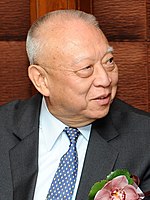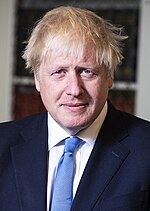2020 Hong Kong national security law
In place since 1971, and never amended, the ordinance sets a legal standard allowing people to be imprisoned simply for handling material deemed to be against the government, without need for evidence.
[15] It gave a more limited definition of "sedition" and increased territorial defences; it was signed by Hong Kong Governor Chris Patten days before the 1997 handover, but was quickly discarded by the Chinese before it could ever come into effect.
The subversion and secession legislation would make it illegal to threaten the presence and stability of the People's Republic of China (PRC) under laws handling treason and war, and also used vague and undefined terms that left the legal threshold for prosecution unclear.
[29] The South China Morning Post reported that the Chinese central government believed that the political climate in Hong Kong, due to the protests, precludes the passage of national security legislation under Article 23, while Chief Executive Carrie Lam added that the protests made the law more necessary than before, and so China resorted to enactment of security measures through the National People's Congress (NPC) instead.
[38] On 9 June 2020, The Guardian's China specialists Tania Branigan and Lily Kuo published a report titled "How Hong Kong caught fire: the story of a radical uprising".
In it, they wrote that "the nature of [Chinese government involvement] is as alarming as its content: it sets a precedent of Beijing forcing unpopular legislation on Hong Kong", in open defiance of the handover terms.
[40] They also look at the approach of the law, explaining that Beijing has given "material security in place of political freedoms" to its people in Mainland China, and plans to do the same in Hong Kong because it sees all issues as purely economical and protests only escalating because of "troublemakers and hostile foreign powers".
[40] In terms of how it is being executed, the pair assert that in 2020, "Beijing has abandoned any pretence of winning hearts and minds", instead using force to prevent democracy politicians and activists from having platforms, which Branigan and Kuo say is a plan to use fear to suppress Hong Kong, as "persuasion" has not worked.
The prospect of any national security law has always been unpopular, but protesters in 2020 said that the new proposals "strikes at the heart of Hong Kong's civic political identity, its success as an international hub.
[39][40] The Hong Kong Bar Association, the city's professional body representing its barristers, issued a statement saying that it was "gravely concerned with both the contents of the [national security law] and the manner of its introduction."
[45] Though the law was not retroactive, many Hong Kong people deleted pro-democracy social media posts and accounts, and asked journalists to destroy evidence of previous conversations.
[54] The One Country Two Systems Research Institute, a pro-Beijing think tank, conducted a telephone sampling survey in May 2020 and interviewed 963 adult citizens in Hong Kong.
Around the same time, the heads of the governing council of Hong Kong's eight publicly funded universities jointly backed Beijing's plan to impose a national security law on the city, specifically "the introduction of legislation which prohibits criminal acts that threaten the existence of the state".
[68] The 10 June 2021 semiannual report (covering the last six months of 2020) stated that Beijing had used the national security law in that period to "drastically curtail" free speech and to "stifle political opposition".
[76] Following persuasion from the UK, all members of the G7, notably including Japan, signed an official statement both urging China to reconsider the national security law and expressing concerns about human rights in Hong Kong on 17 June 2020.
Xia Baolong, Zhang Xiaoming, Luo Huining, Carrie Lam, Teresa Cheng, Erick Tsang, Zheng Yanxiong, Eric Chan, John Lee, and Chris Tang were on the list.
[99] In response, British Foreign Secretary Dominic Raab criticised HSBC's statements, saying "ultimately businesses will make their own judgement calls, but let me just put it this way, we will not sacrifice the people of Hong Kong over the altar of banker bonuses".
[102] In 2021, SOAS University of London warned students and faculty that they could face arrest and prosecution if they brought copies of their lecture notes to Hong Kong or mainland China in either physical or electronic form.
[106] Wintour and Guardian journalist Helen Davidson suggested that the ambiguity and possible conflicting statements on the number of Hong Kong residents the BNO measures will be extended to could reflect several things.
One reason may be differences in opinion within the Cabinet, but Wintour and Davidson also write that it may be a tactic "to leave China guessing about the potential scale of a British-enabled brain drain from Hong Kong, if Beijing seeks to suppress human rights in the territory".
[70] Patterson added that it shows "the severity of the situation on the ground [and] the fact that the British government genuinely, and rightly, feel a sense of duty to citizens of Hong Kong and are going to do all they can to stop them becoming the collateral damage of escalating geopolitical tensions".
[117] According to media reports, the final law would criminalise secession of Hong Kong, subversion against the Chinese government, terrorism, and colluding with foreign forces.
[122][123] The areas of treason, sedition and theft of state secrets are not covered by the new law, and remained to be implemented by the Hong Kong legislature[124] until the enactment of the Safeguarding National Security Ordinance in March 2024.
[7] The rules enable Hong Kong police officers to conduct searches at private properties without a warrant, restrict suspects' movements, freeze their assets and intercept communications.
Joshua Rosenzweig, the head of Amnesty International's China Team, said, "The passing of the national security law is a painful moment for the people of Hong Kong and represents the greatest threat to human rights in the city's recent history.
[5] CNN also expressed concern for the freedom of speech of foreign media, as several companies – including itself, Bloomberg, and Agence France-Presse – have their Asian headquarters in Hong Kong.
[149] On 15 June, the European Parliament passed a resolution concerning Hong Kong's shrinking rights to free speech, and specifically demanded the release of and the dropping of charges against media tycoon and pro-democracy activist Jimmy Lai.
[11] On 21 April 2023, an unnamed female Hong Kong student who came back from Japan to update her ID was detained due to online comments she made that are critical of the HK government.
These are Nathan Law, who left Hong Kong prior to the NSL coming into effect; Simon Cheng, a former employee by the British consulate in Hong Kong who was detained by the PSB and allegedly tortured, and who was granted asylum in the United Kingdom; Ray Wong, who skipped bail and was granted asylum in Germany in May 2018; and pro-independence activists Wayne Chan and Honcques Laus.
[181] During a visit of Lam to Beijing, Senior Vice-Premier and Politburo member Han Zheng on 7 November commended her administration for achieving "notable results" in "implementing the national security law and safeguarding the stability of Hong Kong society".







